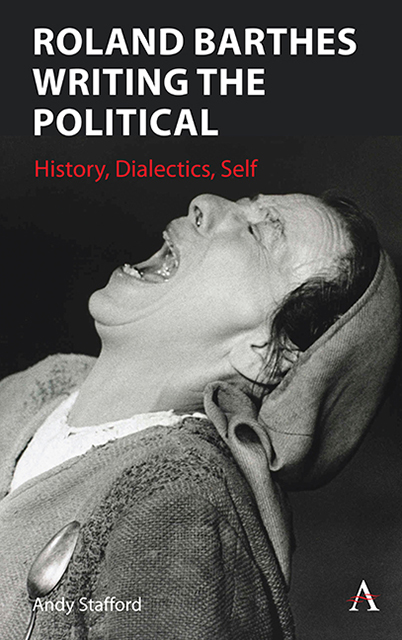Book contents
- Frontmatter
- Contents
- Acknowledgements
- Foreword
- Chapter One ‘The Dialectical Logic of Love’
- Chapter Two ‘Amorous Dialectic’
- Chapter Three ‘The People Chorus’
- Chapter Four ‘Double Grasp’
- Chapter Five ‘Stereographic Space’
- Chapter Six ‘Non-Classifiable’
- Chapter Seven ‘New Dialectic’
- Chapter Eight ‘Opacity’
- Chapter Nine ‘Undialectics’
- Afterword: Essayism and the Politics of Writing
- Bibliography
- Index
Chapter Three - ‘The People Chorus’
Published online by Cambridge University Press: 08 June 2023
- Frontmatter
- Contents
- Acknowledgements
- Foreword
- Chapter One ‘The Dialectical Logic of Love’
- Chapter Two ‘Amorous Dialectic’
- Chapter Three ‘The People Chorus’
- Chapter Four ‘Double Grasp’
- Chapter Five ‘Stereographic Space’
- Chapter Six ‘Non-Classifiable’
- Chapter Seven ‘New Dialectic’
- Chapter Eight ‘Opacity’
- Chapter Nine ‘Undialectics’
- Afterword: Essayism and the Politics of Writing
- Bibliography
- Index
Summary
[I]t is because humans come out of a physical milieu that is clearly shapeless [informe] that they are already demystified.
(Barthes 2002, I, 1067)The ‘subversive complicity’ (Brown 1992, 32) that we have seen in Mythologies, using a range of dialectical innovations, will become in this chapter an intervention by Barthes into theatre. If the theatre is a more performative genre than the essay, the ‘commentary par excellence’ can take on new actions and new possibilities. In this chapter, a consideration of the chorus, the collective commentary, will be the key figure under which Barthes performs a political voice.
In a 1951 article (2015b, 8–11), Barthes likens the ‘many dissident’ Marxists who reject Muscovite dogmatism to the ancient Greek chorus, trying ‘to retain, like the classical chorus, an awareness of misfortune, a sense of hope, and a will to understand’ (10); this is, in 1951, in sharp contrast, to his imagining in 1975 a fiction of ‘choosing’ one's ‘brand’ of Marxism like a clothing item (1994, 156). Two years later, in 1953, describing ancient Greek tragedy as ‘essentially the theatre of a political history that created itself’ – the King in Aeschylus's play The Suppliants meditating on war and peace is his example – Barthes likens this ‘pure human deliberation’ to the Greek chorus (2002, I, 266). Between the three levels on the stage – the people, the kings and the Gods – it is the ‘people chorus’ which holds the ultimate human power: language. However, this chorus is not, as is traditionally thought, a lyrical echo of the actions on stage; rather the chorus is the ‘all-powerful speech that explains and resolves the ambiguity of appearances, bringing the actors movements into a causality that can be understood’ (266–67). Indeed, as the ‘Commentary par excellence’, it is the chorus which supplies the tragic dimension of the play, whilst, as Véron notes (2019, 10), it makes sure that the hero is never alone. Barthes regrets that it is precisely this that is missing in modern and contemporary theatre (not to mention sport, daily life) which has promoted human psychology over political commentary, the actor's humanity over that of the spectator who is silent.
- Type
- Chapter
- Information
- Roland Barthes Writing the PoliticalHistory, Dialectics, Self, pp. 45 - 74Publisher: Anthem PressPrint publication year: 2022

